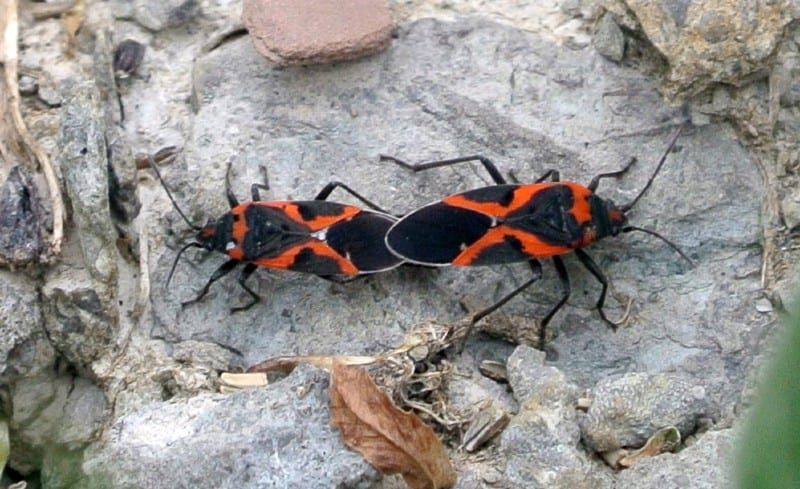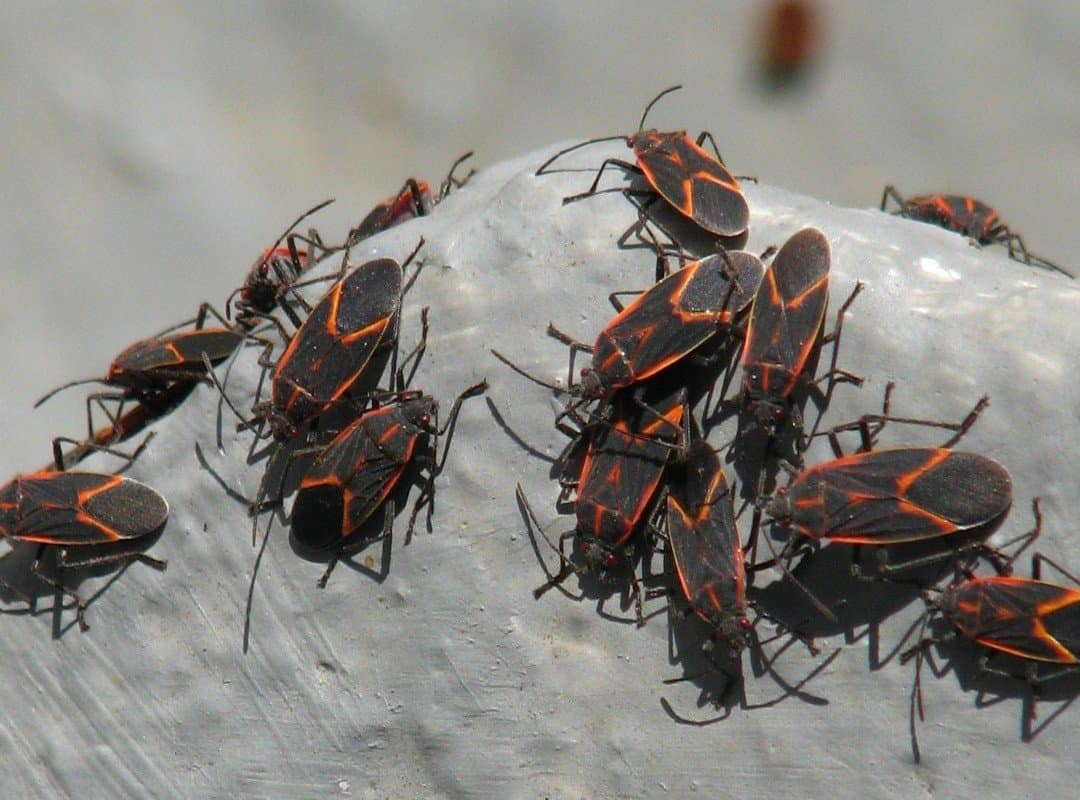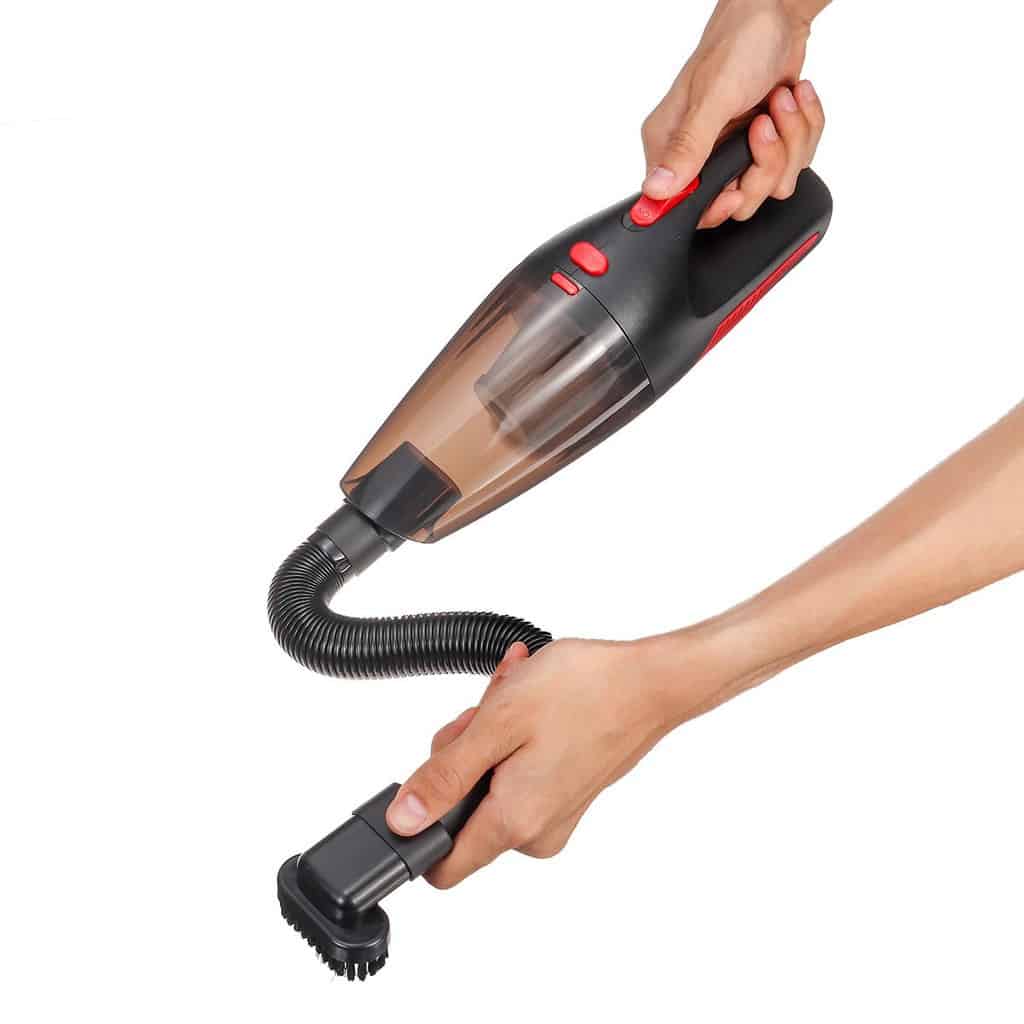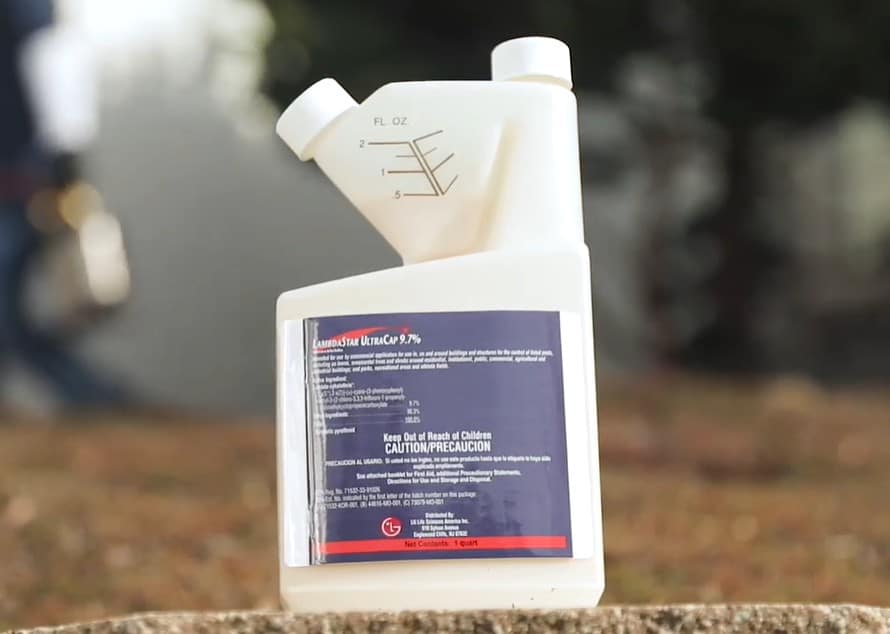If you happen to have a garden or a small tree patch, you are probably more than aware of the Boxelder Bug. These small, box-shaped insects with red and black wings normally reside in box elder trees or similar maple tree sorts. Since they prefer to live in swarms, they might be somewhat difficult to handle and are often confused with the Brown Marmorated Stink Bug.
Here, I’d like to focus on the red-black-winged issue and tell you more about how to get rid of boxelder bugs for good. Mind that eliminating the insects and preventing them from reappearing are two different yet related processes. Shall we?

Boxelder Bugs: A Stinky Neighbor Next Tree
While the insects are a common pest to see on your property, few people actually know what the bug is about and what to do with it. Stranded by the cold, the critters happen to wander around houses and premises, seeking a shelter to hibernate, thus sometimes settling down in the walls or behind baseboards. Revitalized with the heat of in-room radiators, the insects come to live and start doing what they are best at – stinking.
Before learning ways of getting rid of boxelder bugs, let’s have a better look at the species. In this section, you will find the basic information about the critters, as well as a means of dealing with them. Also, consider the treatments I have induced from personal experience to exterminate the bugs once and for all.
What are boxelder bugs?

Visually, the insects are hard to confuse with other outdoor species. Coming to half an inch, the bugs rarely grow to be any bigger regardless of their sex. However, their body may appear elongated due to two thin antennae that work as space-orientation tools.
The body is long and somewhat square-shaped, which is why they are sometimes referred to as ‘boxes.’ As for the color, boxelder bugs can be either black-winged with red stripes or black-winged with orange stripes.
Called boxelder, they are known to mainly inhabit box elder trees where they obtain food and shelter. Full of nutrients, the leaves provide a sufficient supply of fodder for the pests throughout the warmer seasons, while the bark offers a nice hideout during the winter.
There, they lay eggs, using cracks and crevices to protect them from the cold and wind. When hatched, the newly born insects go through the standard nymph cycle before maturing and repeating the cycle again.
What attracts boxelder bugs?
Just like any common insect, the boxes need warmth and protection from the weather. If you pay attention to their behavior, you will see that the critters always gather around warm areas or directly under sunlight.
This need also conditions their habitat, which is the South and East of the state where they find sufficient warmth and humidity. They crawl into houses and barns for the same reason and may find shelter in window cracks, doorways, behind the furniture, etc.
Boxelder bug damage

The insects are known to damage plants rarely since they mostly consume the top layers of leaves. Also, neither are they dangerous to humans or animals since the bugs are completely herbivorous. However, they are rather annoying and may lead to excessive odors or staining.
Contrary to the common opinion, the critters don’t give off any unpleasant smell or leave any stains during their daily activities. On the other hand, once crashed, their bodies begin to emit a formidable stench that is very difficult to get rid of. Normally, it works as an anti-predator defense that deters birds and larger insects from them.
Signs of boxelder bug infestation
It’s never an infestation until it is. The first and most prominent signal of a boxelder bug infestation is the bugs’ large congregations. Secure about being repulsive to possible predators, the insects easily gather together in one spot to begin breeding and nesting.
Generally, they prefer to gather in and around crevices and cracks to lay their eggs there in case of the cold or unfavorable weather.
Another sign you might notice is the smell. Though each of the insects gives off a faint scent somewhat similar to mint, the smell becomes rather unbearable once there is a whole bunch of insects in one stop. The same applies to stains, while the bugs leave wastes on surfaces. Due to this, boxelder bug removal may be more complicated since the stains are hard to wash off.
[su_note note_color=”#e5e2d4″]Related post: How to Get Rid of Asian Beetles [/su_note]
How to get rid of boxelder bugs
While it’s hard to control boxelder bugs when they have contaminated an area, there are still proven methods, both natural and chemical, to weaken their influence or even deal with them for good. Choose one of the following ways or use a combination of them:
- Apply soap and water.
Yes, it may seem a little ineffective, but using regular soap has a lot of benefits when it comes to dealing with the insects. Spraying the pests with a mixture of soap and water can not only scare them away but also kill a couple of them. Since the bugs act as a herd, it will be an alarming signal for them to flee.
- Utilize pesticides.
Pesticides are a reliable means of fighting the pests. Having Deltamethrin and similar components in them, sprays and solutions exterminate boxelder bugs within days, making the infested area unhabitual for them to keep on breeding. Make sure to spray surrounding areas and nearby crevices/cracks as well, since there may be some eggs left.
- Use a vacuum cleaner.
If you have an infestation indoors, there is nothing more effective than a good-old vacuum. By destroying adult bugs, you prevent them from contaminating your house with stains and smells. Mind that this species doesn’t normally breed inside, but it simply chooses a shelter to hibernate. However, getting rid of the bugs is a must to prevent them from infesting your yard or porch.
- Scatter anti-insect powders around doorways and window seals.
Made of Diatomaceous Earth, powders are designed to cause insects to desiccate. It’s a very useful treatment for prevention as it doesn’t allow the pests from entering crevices to lay eggs. Moreover, it’s a completely natural way to get rid of boxelder bugs without using chemicals or toxins.
How to prevent boxelder bugs
It may be surprising, but there are a couple of things that can help you guard your property against the pests. Following a simple routine and using a set of solutions will prove very useful to repel boxelder bugs before it’s too late. Here is what you can do:
Step 1: Regular maintenance
If you have found a boxelder bug on your property, you need to consider checking your yard and inside the house every now and again. This also includes cleaning the areas around window ledges, doorways, and plant pots regularly. Apply soapy water to the areas and keep them sealed from any outside intrusion. Also, make sure vacuum-clean around the baseboards, since those are comfortable places for the bugs to nest.
You may apply cedar and need oils to crevices by combining them with water. Just like other minor pests, boxelder bugs find cedar repulsive enough to be driven away by the scent, where neem can have natural toxins that can disable them right away. Don’t forget to place traps for insects if the insects keep getting into your house.
Step 2: Secure the area
After treating your property with a home remedy for boxelder bugs, it’s essential to prevent new insects from entering the house. For this, you have to mend accessible for them places, like window cracks, door posts, etc. The most proven method is, of course, to use sealants and coatings that easily get into the places and seal off them for good.
However, you may as well make a mixture of lemon and garlic, combined with a sealant. Now, the concoction will get petrified and block the cracks, but it will also act as a nice repellent. Mind that the smell may be a little distinct for people as well.
Step 3: Use professional treatments
Useful both outdoors and indoors, pesticides are always a solution to the problem. Spray treatments around garden plants to prevent the bugs from getting together and to get rid of boxelder bugs outside the house. Normally, these substances are organic, so don’t be afraid of contaminating your vegetable patches and plants.
Also, treat your porch and near-the-door area with powders. They are especially useful in spring and summer, which are the mating seasons before boxelder bugs complete their fall stampede. Upon the first contact, the powder sticks to the insects’ hair, encouraging them to spread the solution to other bugs.
[su_note note_color=”#e5e2d4″]Related post: How to Get Rid of Crickets [/su_note]
Top 3 Best Boxelder Bugs Treatments
Despite having a whole array of effective products, you might find yourself a little flabbergasted when browsing the Internet for them. I’ve been there before and know that sometimes you simply can’t afford the time for research. Therefore, I’ve prepared some treatments that know how to kill boxelder bugs. Take a look!
1. HARRIS Diatomaceous Earth Crawling Insect Killer — Best Indoor and Outdoor Treatment
[amazon box=”B082LRSCV8″ template=”vertical” tracking_id=”how-to-get-rid-of-boxelder-bugs-20″ button_text=”Check price on Amazon” button_detail=”https://shareasale.com/r.cfm?b=1724849&u=2583381&m=107474&urllink=diypestcontrol%2Ecom%2Flambdastar%2Dultracap%2D9%2D7&afftrack=how%20to%20get%20rid%20of%20boxelder%20bugs” button_detail_text=”Check price on DoMyOwn”]
Specifications:
- Active Ingredient: Diatomaceous Earth
- Item Form: Powder
- Item Weight: 4.37 Pounds
- Package Dimensions: 15.67 x 10.16 x 5.31 inches
- Target pests: Cockroaches, Fleas, Ants, Bed Bugs & More

As I’ve mentioned before, powders are more than effective treatments for boxelder bugs. This one is my favorite powder product because it’s very easy to use, and it works only on harmful bugs, sparing beneficial insects. It comes in 4-lb bags, which provides a sufficient amount for spacious area treatment.
The product includes a nice, handy duster that facilitates spreading the solution even in the most hard-to-reach places. Treat the areas around windows, doors, furniture, as well as outside porches, doorsteps, and plants. Since the active ingredient is Diatomaceous Earth, the powder is completely safe for pets, plants, and humans, leaving no stains.
| Pros: | Cons: |
|
|
2. Rockwell Labs LambdaStart UltraCap Insecticide — Best Insecticide for Crawling Pests
[amazon box=”B007EC692U” template=”vertical” tracking_id=”how-to-get-rid-of-boxelder-bugs-20″ button_text=”Check price on Amazon” button_detail=”https://shareasale.com/r.cfm?b=1724849&u=2583381&m=107474&urllink=diypestcontrol%2Ecom%2Flambdastar%2Dultracap%2D9%2D7&afftrack=how%20to%20get%20rid%20of%20boxelder%20bugs” button_detail_text=”Check price on DIY Pest Control”]
Specifications:
- Active Ingredient: Lambda-cyhalothrin 9.7%
- Item Form: Spray
- Item Weight: 1.26 pounds
- Package Dimensions: 2.05 x 4.25 x 7.85 inches
- Target pests: Variety Of Household Insects Such As Large Roaches, Spiders, Scorpions And More

This insecticide is the best way to kill boxelder bugs that have already occupied a vast area. Suitable for both indoor and outdoor spraying, the solution comes capsules that need to be mixed with water and then applied to infested places. Mind that it’s a strong insecticide, which has a specific Lambda-cyhalothrin formula for killing, not preventing bugs.
The top cap has a gauge scale to help you measure the exact amount of the solution you need. When mixed with water, spread it in an infested area and let it dry out. Apart from boxelder bugs, the treatment is also effective against ants, scorpions, and fleas, which ensures a full-range pest control for your property.
| Pros: | Cons: |
|
|
3. HARRIS Liquid Spray Extended Formula — Best Boxelder Bug Killer Spray with a Handle
[amazon box=”B003YHJ75K” template=”vertical” tracking_id=”how-to-get-rid-of-boxelder-bugs-20″ button_text=”Check price on Amazon” ]
Specifications:
- Active Ingredient: Deltamethrin
- Item Form: Spray
- Item Weight: 2.42 Pounds
- Package Dimensions: 5 x 3 x 12 inches
- Target pests: Asian Lady Beetles, Boxelder Bugs
If you want to avoid the chemical smell, this solution is a great option for outdoor use. It’s easy to use thanks to the in-built spray handle that can be applied for unreachable cracks. Besides, it not only kills the existing bugs but also makes the area bug-free, preventing their reappearance.
The 1-gallon container has enough solution for treating the whole near-the-house area, as well as the premises. Thanks to the residual formula, the product leaves residues that act as preventative care against bugs and insects. Make sure to follow the instructions to use the product’s full potential.
| Pros: | Cons: |
|
|
FAQs
Check the following questions to learn more about boxelder bugs control.
What do boxelder bugs eat?

The insects’ main food source is seeds and plant beginnings.
[su_note note_color=”#e5e2d4″]Related post: How to Get Rid of Lady Bugs [/su_note]
How long do boxelder bugs live?
Fortunately, the insects live for no longer than 3 months and mainly during the warmer seasons.
Why do boxelder bugs like my house?
There are no attractants for the bugs since the only thing they need is warmth. They are drawn to the house in search of shelter to hibernate.

Harmless Doesn’t Mean Friendly — Get Rid of Boxelder Bugs Now!
As you can see, these pests are not the most dangerous fellas in the garden. Looking for shelter and food, they may come across your property to propagate. However, their presence is a disturbing occurrence that leads to unpleasant smells and vegetation damages. Use insect powders to prevent the critters from wandering in your house and apply pesticides to eliminate the most daring ones.
Having learned something new, you can use my expertise to purge your property of the intruders. Tell me, what kind of treatments are you using now? Have the bugs ever caused any real damage to your plants? Comment below!
References:
- Boxelder bugs complete their fall stampede (Michigan State University):
https://www.canr.msu.edu/news/boxelder_bugs_complete_their_fall_stampede - Boxelder Bug (University of California Agriculture & Natural Resources):
http://ipm.ucanr.edu/PMG/PESTNOTES/pn74114.html
